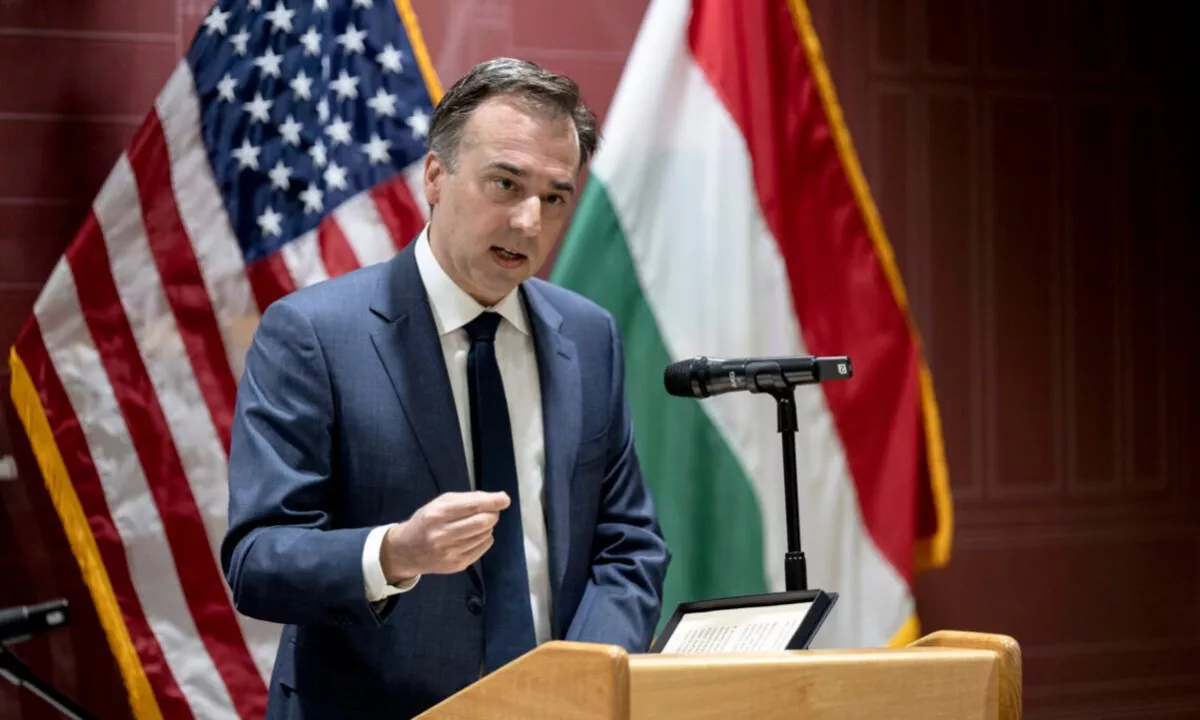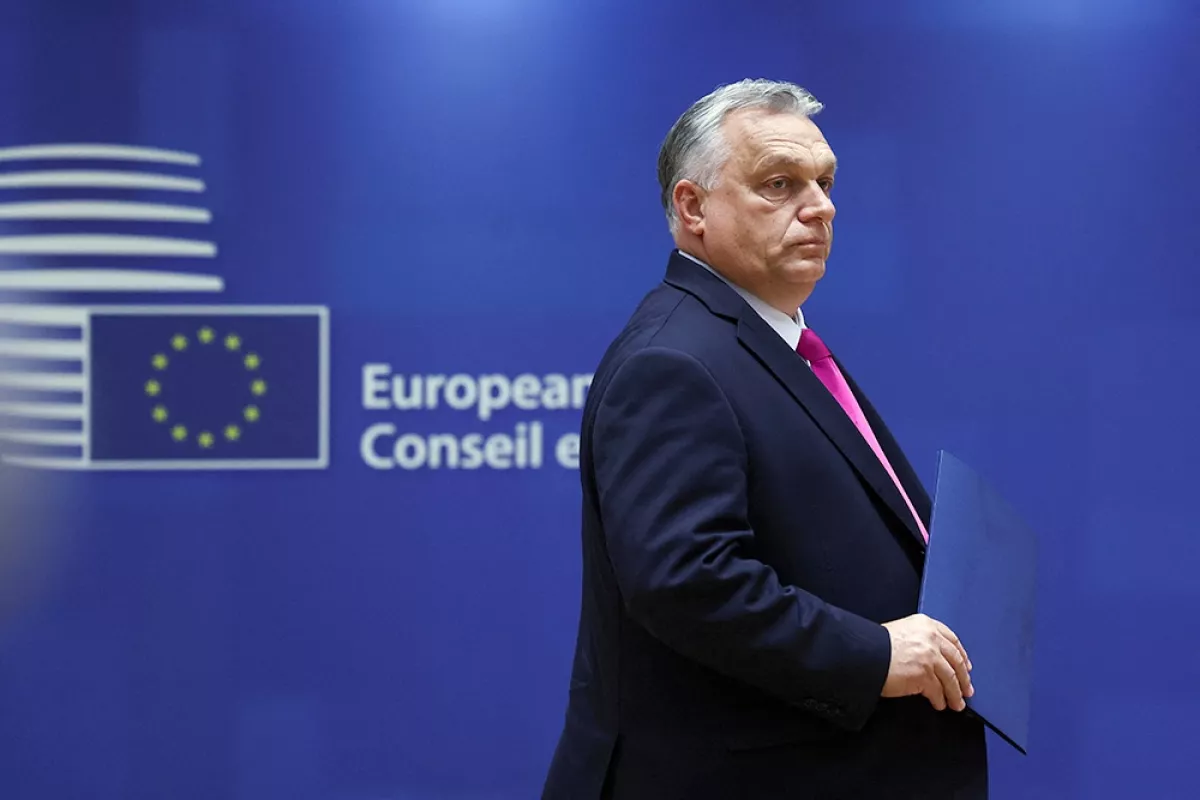US, EU apply "delicate" pressure on Hungary A Tense Standoff
The end of last week was marked by yet another scandal in the relations between Hungary and its Western partners. During the opening of the Budapest Forum, hosted by the Central European University and the Budapest municipality, US Ambassador David Pressman launched a sharp criticism against the Hungarian leadership.
In his fiery speech, the diplomat accused the Hungarian authorities of hypocrisy and disloyalty: “How can the country of 1956 also be so cosy with Putin’s Russia? How can a country be both a member of the European Union and also at war with ‘Brussels?’ How can an Ally of the United States also, in the Prime Minister’s words, be its ‘adversary?’ Hungary criticizes NATO from within the comfort of the NATO security umbrella, and Hungary criticizes the EU under subsidy of the EU’s economic umbrella.”

Pressman threatened that Hungarian Prime Minister Viktor Orbán would face a day of “reckoning,” but he did not specify what kind of consequences were being implied.
During the Cold War, within the opposing blocs of East and West, there were countries that occasionally attempted to pursue their own political paths, challenging the authority of their "big brother" (the US and the USSR, respectively). In the West, this country was France, which even withdrew from NATO's military structures in the 1960s. In the East, the main disruptor was Romania, which maintained ties with China, did not sever diplomatic relations with Israel, and actively developed economic, — and at times even military — partnerships with countries from the Western bloc. Today, it seems that Hungary holds a similarly independent stance within the European Union and NATO. Interestingly, the reasons behind this are largely connected to the events of 1956, which the American ambassador so recklessly referenced.
It’s worth recalling that Hungary’s ruling party, Fidesz, and its leader, current Prime Minister Viktor Orbán, came to power in 1998. Two years earlier, the country had been shaken by an economic crisis, for which Hungary’s Social Democratic Party, led by Ferenc Gyurcsány, was held responsible. The Social Democrats were direct successors of the Hungarian Socialist Workers' Party (HSWP), which had ruled the country until 1989, and after the collapse of the socialist bloc, they became loyal executors of the will of their new masters—the United States and the structures of the European Union. When the press leaked a recorded speech by Gyurcsány, in which he admitted to lying to voters about the state of the country "morning, noon, and night," the nation erupted in unrest, the largest protests since the anti-Soviet uprising of 1956. Crowds clashed with police on the streets of Budapest, nearly recreating the events of half a century earlier. This turmoil paved the way for the success of Fidesz, which positioned itself as the true heir to the right-wing conservative forces.
For many Hungarians, the international order within the EU and NATO has begun to strongly resemble the dependence on the Soviet Union after World War II. In 2023, Viktor Orbán openly stated: "History sometimes repeats itself. Moscow was a tragedy. Brussels is only a bad contemporary parody. We had to dance to the tune that Moscow whistled, Brussels whistles too, but we dance as we want to, and if we don’t want to, then we don’t dance."
The European Union chose to ignore these accusations, which may resonate with many Europeans but are rarely spoken about openly. Instead, Budapest faced accusations of undermining the autonomy of the judiciary, "suppressing" independent media, and, of course, corruption. Observers have long noted that every leader who becomes the target of EU and US criticism is sooner or later exposed as corrupt. Apparently, a propensity for bribery is somehow linked to their "wrong" political views.
The problem is that Hungary is a member of both NATO and the EU, making the traditional measures used against unfavourable regimes—ranging from "colour revolutions" to carpet bombings—inapplicable. As a result, the pressure on Viktor Orbán remains relatively subtle for now. For instance, in 2023, the European Parliament voted to strip Hungary of its right to hold the rotating presidency of the Council of the European Union in the second half of 2024.
Brussels can also hit Budapest financially. If Hungary doesn’t vote the way EU officials want, the EU freezes its funding. However, according to Nikolai Topornin, a researcher at MGIMO, this is partly a game: "Hungary has a pending loan from the European Commission worth €30 billion. That’s a huge sum for Hungary, and Orbán has found a way to secure it. For example, he can keep needling Ukraine, and when key decisions come up, he questions why funds should be allocated to Kyiv. In the end, through backroom negotiations, Hungary is granted €10 billion, and Orbán conveniently leaves the room during votes on Ukrainian issues."
Some European media outlets and politicians have called for Hungary to be stripped of its voting rights in the European Council, but even the most ardent advocates of tough measures against Budapest acknowledge that this is a complex and murky process, with no clear guidelines laid out in EU documents.
At the same time, Hungarian authorities are not content to simply "play defence." Budapest is investing heavily in securing political allies and promoting its own vision for Europe's future. Viktor Orbán and his allies make no secret of their alignment with conservative values, which they see as central to their political identity and strategy.

In 2021, the Hungarian government purchased a mansion in the heart of Brussels, which has since been dubbed the "Hungarian House." According to Hungary's ambassador to Belgium and Luxembourg, Tamás Iván Kovács, this building will serve as a venue for meetings and cultural events, where ministers, diplomats, and experts will convene.
The ideology promoted through the "Hungarian House" is being developed by experts from the Mathias Corvinus Collegium (MCC), a conservative think tank closely linked to Viktor Orbán's government. The Hungarian state has allocated €1.4 billion to fund MCC, with a significant portion of these funds going toward educational programs, particularly aimed at children from disadvantaged families, instilling them with conservative values. As one of the leaders of MCC and advisor to the Prime Minister, Balázs Orbán, stated: "There is a chance that these children will become the leaders of Hungary's next generation, not only in politics but also in culture, economics, and business."
Budapest also funds the European Conservative, an English-language magazine and website promoting conservative viewpoints.
According to experts from Politico, Viktor Orbán is critical of the European Union but has no intention of leaving it. Rather, he seeks to reshape it according to his own vision. Central to this vision is the concept of sovereignty—the ability to use veto power to block unfavourable decisions. The Hungarian government also desires freedom of foreign policy manoeuvring, similar to the approach Türkiye has demonstrated in recent decades.
Whether Hungary will succeed in maintaining its course or if the US and the EU will eventually secure a more compliant government in Budapest remains to be seen. For now, both sides are locked in a stalemate. Orbán’s administration continues to hold power firmly, but within the broader European context, Hungary remains isolated, despite the growing conservative sentiment across the continent.








